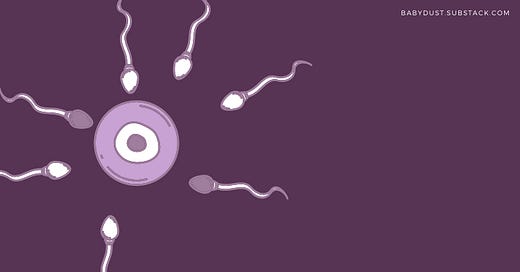Enjoy this post? Support the mission of Baby Dust (and the author’s coffee obsession).
The Guardian dropped a bombshell interview on Sunday outlining the extent that environmental toxins are impacting fertility. You’ll find the article featured below along with a few other tidbits that we think you’ll find useful. Just for fun, we’ve also added a one-question quiz to test your fertility knowledge!
Baby dust,
Hannah XO
P.S. We’re trying a different format this week! Let me know if you find this new way of delivering information to be more useful.
Tip of the Week
Going organic is a great way to lower your overall toxic load. Can’t afford 100% organic? Go for the Dirty Dozen and Clean 15.
Help us spread the word about the disastrous impacts of environmental toxins on fertility Send this newsletter with three friends right now!
Featured Article: “Most couples may have to use assisted reproduction by 2045”
Shanna Swan - professor of environmental medicine and public health at Mount Sinai School of Medicine - has been studying fertility for the last 20 years. She has identified environmental toxins as a major factor in the challenge many couples face in getting pregnant. In fact, she’s attributing environmental toxins as the reason an increased number of couples are struggling with infertility and miscarriages. The most disastrous time to be exposed to these chemicals? In utero. So, it’s important to eliminating toxic exposures as much as possible before getting pregnant. Read the entire interview here.
Quiz Yourself
Q. When is the best time to be intimate when trying to get pregnant? (Find the answer at the bottom of this email.)
Environmental Toxins = Fewer (and Lower Quality) Eggs
Toxic exposure has been found to impact the fertility of developing babies in addition to causing permanent changes to animals in reproductive studies. In IVF, women with “higher phthalate levels had a lower number of retrieved eggs, lower pregnancy rates, and higher risk of early pregnancy loss before 20 weeks gestation.” Phthalates also damage sperm and contribute to abnormalities. Read the article.
Study finds unknown toxins in babies. (& moms!)
50 new (read: never before seen in humans) chemicals have been found in infant cord blood. We don’t fully understand the long-term impacts of these toxins on the child’s health, but the toxins we are aware of, such as phthalates, are already known to cause significant issues. Click here for the details.
Begin eliminating environmental toxins from your life now so that your baby is exposed to as few chemicals as possible while developing!
Podcast: How to Tackle Everyday Toxic Exposures with Lara Adler
Overwhelmed by the thought of eliminating environmental toxins? Lara Adler - the queen of all things toxins - breaks down how to minimize exposure in this interview. Give it a listen.
Other Useful Information
Men, just say no to testosterone. Turns out that supplementing testosterone for men with low testosterone may actually backfire and result in a total shutdown in producing…you guessed it…testosterone. Not great for the little swimmers.
Regular ovulation is really important for women’s health, not just making a baby. The hormone shift associated with the big O helps to lower the risk of developing various diseases and cancers down the road.
Hey girl, is this a pregnancy symptom? While no single symptom has been identified as a surefire early pregnancy sign, there are a few that *might* indicate that you have a bun in the oven. Check out the list here.
Coupons
10% off your first needed. order with BLISSBERRYWELLNESS
10% off your first Seeking Health order with BLISSBERRYAPRIL
15% off Legacy at-home sperm testing products with blissberrylegacy
Quiz Answer: 3-5 days before you ovulate! If you wait until you have a positive OPK, you’re likely to miss the window! (What to know more about timing sex for conception? Get the inside scoop in the Ovulation Masterclass.)
Disclaimer: This email is for educational purposes only and does not constitute medical advice. Please speak to your care provider before making any changes to your diet, lifestyle, or currently prescribed medications. This email contains affiliate links. You will not be charged extra for purchasing through one of our links, but a small portion of the proceeds will go to support Baby Dust.




